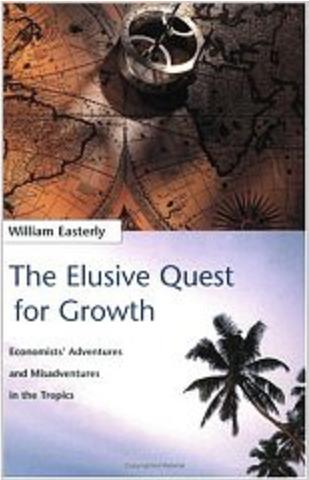The Elusive Quest for Growth: Economists' Adventures and Misadventures in the Tropics
by William Easterly
(The MIT Press, Cambridge Mass, 2002)

William Easterly is an American economist from the World Bank. In this book, he reflects on the mistakes made by the World Bank and the International Monetary Fund over aid funding to poor countries since World War II. It is thick with real insights. It relates a string of aid and development policy fashions over the period and tests them against their outcomes. The answer, of course, is a string of policy failures. Easterly seeks the answers.
Take one very prominent example: the Jubilee 2000 campaign to forgive the debt of poor countries. The churches, with prominent figures such as the Pope and the Dalai Lama, and the usual motley lot of do-gooders with their stars such as Bono of rock group U2, pressed Western governments to forgive the debt of the poorest countries. Let them start afresh without this burden placed on them by the West and all will be well, was the argument. As a true economist, Easterly tested the incentives in this policy of debt forgiveness. In the first instance, the big problem is that debt forgiveness is not new. The World Bank/ IMF Highly Indebted Poor Countries Initiative, now running at $27 billion, stands on the shoulders of decades of previous rounds of debt forgiveness.
The promise of Jubilee 2000 is no different to all of those that have gone before. "The debt campaigners treated debt as a natural disaster that just happened to strike poor countries". The truth is not so charitable. Countries that borrowed heavily did so because they were willing to mortgage their future. They were irresponsible, they sold productive assets into unproductive hands, they built unproductive infrastructure, they favoured one ethnic group over another, or one region over another, they ran inflated economies, they were corrupt, they waged war, they allowed black markets to develop because they controlled exchange rates and interest rates. And all the rest of the sordid details.
Data for 41 highly indebted countries -- Angola, Benin, Bolivia ... Zambia -- show that total debt forgiveness from 1989 to 1997 was $33 billion, while their new borrowing in the same period was $41 billion. Moreover, new borrowing was highest in the countries that received the most debt relief. In other words, the system rewarded debt; the incentives were terribly wrong. Clearly, there were irresponsible lenders as well as irresponsible borrowers.
What to do?
Easterly's insights -- based on and learning from his own and his profession's readily admitted mistakes -- are those of an obviously brilliant economist. An economist brought to book by experience, or as one commentator remarked, "a lifetime idealist mugged at last by reality". These insights are conceptually simple: first, growth helps the poor, and second, people, rich and poor, governments and donors, respond to incentives.
First, he asks,
Does the government of each nation face incentives to create private-sector growth, or does it face incentives to steal from private business? In a polarised and undemocratic society, where class-based or ethnically based interest groups are in a vicious competition for loot, the answer is probably the latter ... In a democratic society with institutions that protect the right of minority interest groups, institutions that protect the right of private property and individual economic freedoms, governments face the right incentives to create private sector growth.
Second,
Does each donor give a vested amount of aid to each country, so as to justify next year's aid budget? ... Do the World Bank and the IMF give loans to the Mobutus of the world, or support aid to governments that can present credible intentions to build national infrastructure and help the poor?
Third, individuals and businesses may face poor incentives from bad governments, but additionally they face low incentives to grow because their productivity depends on that of other poor people. Aid that matches grants to the poor with increases in their own income as opposed to penalties, which is standard in welfare systems, can help correct poor incentives.
Easterly's contribution, when matched with Hernando De Soto's, Mystery of Capital, which brilliantly argues the case for property rights for the poor as the path to wealth in the Third World, provide a welcome intellectual fillip to those who view themselves as both on the right and in the right. It is a splendid book.
No comments:
Post a Comment